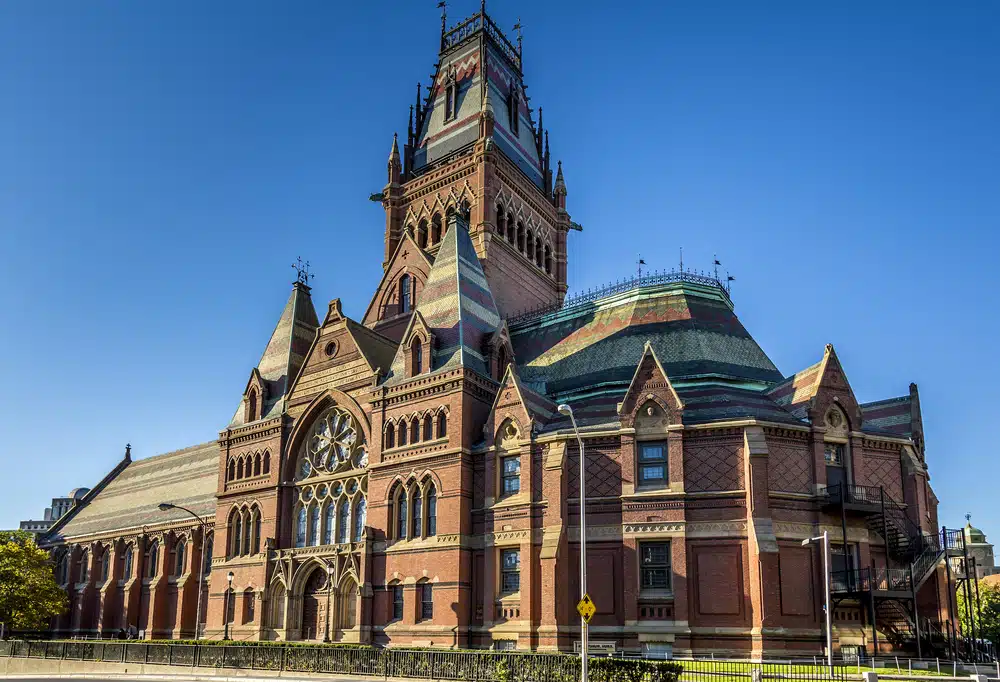Harvard’s ranking has long been a subject of intrigue and admiration for both aspiring students and academic professionals. As one of the world’s most prestigious institutions of higher learning, Harvard’s consistently high placement in global university rankings reflects its commitment to excellence in education, groundbreaking research, and an impressive alumni network.
With a well-deserved reputation as an academic powerhouse, understanding the factors behind Harvard’s Ranking provides insight into what sets this esteemed institution apart from the rest.
Exploring Harvard University’s ranking in depth allows us to examine the qualities that contribute to its outstanding academic stature. By analyzing the criteria used by major-ranking organizations and examining the university’s performance in each of these areas, we can better appreciate how Harvard maintains its position at the forefront of global academia.
Delving into the various aspects that influence Harvard’s ranking, from faculty quality to research output, highlights the unique combination of factors that solidify Harvard’s status as a world-class institution.
Overview of Harvard University
Harvard University is a private Ivy League research institution located in Cambridge, Massachusetts, United States. Established in 1636, it is the oldest institution of higher learning in the country and boasts a rich history that has shaped its character and reputation over the centuries. Known for its commitment to academic excellence, innovative research, and exceptional faculty, Harvard’s ranking has been consistently among the top universities in the world.
Spanning 5,076 acres and comprising 13 schools and institutes, Harvard offers undergraduate, graduate, and professional degree programs in a wide range of disciplines, including arts and sciences, business, education, engineering, law, medicine, public health, and more. Its undergraduate college, Harvard College, is renowned for its rigorous liberal arts and sciences curriculum, with more than 40 academic departments and an emphasis on interdisciplinary learning.
The university’s faculty is comprised of world-renowned scholars and researchers, including numerous Nobel Prize winners and other prestigious award recipients. With access to cutting-edge facilities and resources, Harvard faculty members conduct groundbreaking research that contributes to the university’s strong reputation for innovation and discovery.
In addition to its rigorous academic programs, Harvard offers students an array of extracurricular opportunities and support services designed to enhance their educational experience and personal growth. From clubs and organizations to internships and study abroad opportunities, the university fosters an environment that encourages intellectual curiosity, personal development, and community engagement.
Harvard’s extensive financial aid program ensures that students from diverse socioeconomic backgrounds have the opportunity to attend and benefit from its world-class education. Its robust endowment of over $40 billion allows the university to offer generous aid packages, eliminating financial barriers for many prospective students.
The powerful network of over 300,000 Harvard alumni across the globe includes influential leaders in various sectors, from government and business to academia and the arts. This far-reaching network offers invaluable connections and support for current students and graduates, enhancing the university’s impact on society at large.
As an academic powerhouse with an unwavering commitment to excellence, Harvard University continues to be a beacon of higher education, attracting the brightest minds from around the world and shaping the leaders of tomorrow.
What is the Ranking of Harvard University?
What is the ranking of Harvard University? Harvard University’s ranking has been consistently impressive across various well-known ranking systems, a testament to its commitment to excellence in education, research, and faculty quality. Ranking organizations such as QS World University Rankings, Times Higher Education (THE), and U.S. News & World Report all place Harvard near the top of their lists, emphasizing the university’s unparalleled reputation in the global academic landscape.
U.S. News & World Report
According to U.S. News & World Report, Harvard University frequently ranks among the top three institutions in their Best National Universities list, which assesses universities within the United States. In 2022, Harvard was in 3rd place in the National Universities list. In the Best Global Universities rankings, which evaluate institutions worldwide, Harvard consistently claims the first spot, highlighting its exceptional global reputation and influence.
U.S. News & World Report uses a comprehensive methodology to rank universities, taking into account factors such as academic quality, faculty resources, graduation and retention rates, financial resources, social mobility, alumni giving, and expert opinions on institutional reputation. These criteria aim to provide a well-rounded assessment of an institution’s overall performance and quality.
Harvard University’s high ranking in U.S. News & World Report reflects its unwavering commitment to academic excellence, world-class faculty, cutting-edge research, and diverse student body. As one of the top universities in the United States and the world, Harvard attracts exceptionally talented students and faculty, making it a hub for innovation, knowledge, and global leadership.
The consistently high ranking of Harvard University according to U.S. News & World Report not only solidifies its prestigious status in the higher education landscape but also serves as an important benchmark for prospective students, researchers, and academics when considering the university for education, research, or collaboration.
Times Higher Education
The Times Higher Education (THE) World University Rankings is a prominent ranking system that evaluates universities across the globe based on a set of comprehensive criteria. These criteria include teaching, research, citations, industry income, and international outlook. In this system, Harvard University consistently secures a spot within the top ten institutions, reflecting its exceptional performance across these critical areas.
In the 2023 edition of the “THE” World University Rankings, Harvard was placed 2nd worldwide and also ranked 1st in the US College Rankings 2022 which demonstrates its continued commitment to academic excellence, groundbreaking research, and global impact. This high ranking highlights the university’s ability to attract and retain world-class faculty, promote a stimulating and innovative learning environment, and produce influential research with a wide-reaching impact.
The teaching criterion within THE rankings encompasses the learning environment, faculty reputation, and student-to-staff ratios. Harvard excels in this area, offering a rigorous curriculum, highly esteemed faculty, and small class sizes that facilitate close interaction between students and professors.
Research, another key criterion, evaluates the volume, reputation, and funding of research conducted at an institution. Harvard’s impressive research portfolio, state-of-the-art facilities, and extensive collaborations contribute significantly to its high ranking in THE World University Rankings.
Citations refer to the impact of a university’s research, measured by the number of times its research outputs are cited by other scholars. A high citation impact signifies that the institution’s research is considered groundbreaking and influential within the academic community, and Harvard consistently ranks high in this area as well.
Furthermore, Harvard’s strong international outlook, characterized by its diverse student and faculty populations and global collaborations, also contributes to its high placement in THE rankings.
Harvard University’s impressive position in the Times Higher Education World University Rankings underscores its status as a leader in higher education. Prospective students, academics, and researchers can look to Harvard’s THE ranking as an indicator of the exceptional education and research opportunities available at the institution.
QS World University Rankings
The QS World University Rankings is a prestigious ranking system that evaluates universities worldwide based on a variety of factors, such as academic reputation, employer reputation, faculty-student ratio, citations per faculty, and international faculty and student ratios. In this system, Harvard University consistently ranks among the top three institutions, demonstrating its commitment to academic excellence, world-class faculty, and groundbreaking research. Harvard is ranked #5 in QS World University Rankings 2023.
Harvard’s exceptional performance in the QS World University Rankings is a reflection of its strong performance across various ranking criteria. The university’s academic reputation, which is assessed through a global survey of academic peers, is unparalleled, highlighting its stature as an institution at the forefront of research and education.
Employer reputation is another criterion in the QS ranking system, which gauges the employability of an institution’s graduates. Harvard’s high score in this area is indicative of the strong demand for its graduates in the job market, as well as the global recognition of a Harvard education.
The faculty-student ratio is a measure of the resources dedicated to teaching and the accessibility of faculty to students. With its relatively low student-to-faculty ratio, Harvard provides personalized learning experiences and close interactions between students and professors, ensuring a high-quality education.
Citations per faculty is a metric that evaluates the impact of an institution’s research by examining the number of times its research outputs are cited by other scholars. Harvard’s high score in this area showcases the influence of its research, reflecting its reputation for producing groundbreaking and innovative scholarship.
Lastly, the international faculty and student ratios are an indication of a university’s diversity and global outlook. Harvard’s strong performance in these criteria highlights its commitment to attracting students and faculty from around the world, fostering a culturally rich and diverse learning environment.
In addition to the overall Harvard ranking, the university also claims top spots in several subject areas in the QS World University Rankings by Subject, such as life sciences and medicine, social sciences and management, and arts and humanities. These high subject-specific rankings further emphasize the university’s excellence across a wide range of disciplines.
Harvard University’s impressive position in the QS World University Rankings is a testament to its exceptional academic and research performance, making it one of the most sought-after institutions in the world for students, academics, and researchers alike.
Harvard University’s consistently high rankings across these systems are indicative of its dedication to academic rigor, world-class faculty, groundbreaking research, and global impact. Prospective students, academics, and researchers alike recognize the prestige associated with Harvard’s ranking, making it one of the most sought-after institutions in the world for both education and professional development.
How is Harvard Ranked?
How is Harvard ranked? Harvard’s consistently high ranking in various systems signifies the strength and prestige of the institution. These rankings attract high-caliber students and faculty, enhance the university’s global reputation, and help secure funding for research projects. Additionally, employers view degrees from highly-ranked institutions as a mark of quality, making Harvard graduates more competitive in the job market.
Several factors contribute to Harvard’s high ranking across different ranking systems. The different factors for Harvard’s ranking may include:
Academic Reputation: A major component of Harvard’s ranking is its stellar academic reputation. This is determined by surveying academics worldwide and considering factors such as teaching quality, curriculum, and intellectual climate. As a leading research institution with numerous Nobel Prize winners and prestigious awards among its faculty, Harvard excels in this criterion.
Faculty Quality: Harvard consistently attracts world-renowned faculty members and researchers. The university’s commitment to hiring the brightest minds in various disciplines contributes significantly to its high ranking. Faculty quality is often evaluated based on the number of awards and distinctions they receive, such as Nobel Prizes, Fields Medals, or other prestigious accolades.
Research Output: The volume and quality of research conducted at Harvard are instrumental in its ranking. Rankings organizations assess research output using various indicators, including the number of publications in prestigious journals, total research funding, and research-related awards. Harvard’s impressive research portfolio, cutting-edge facilities, and extensive collaborations contribute to its standing.
Employability: The employability of a university’s graduates is a crucial factor in its ranking. Harvard is well-known for producing highly employable graduates who secure prestigious positions in various sectors worldwide. Factors contributing to its strong employability include the university’s rigorous academic programs, extensive professional development opportunities, and robust alumni
Why Do College Rankings Matter?
Why do college rankings Matter? College rankings play a significant role in shaping the reputation and public perception of an institution like Harvard University. They serve as a critical source of information for prospective students, parents, faculty, researchers, donors, and employers, offering a comparative evaluation of various institutions and influencing decision-making processes.
The high rankings consistently achieved by Harvard are a testament to its continued commitment to excellence in education, research, and global impact. There are several reasons why these rankings matter for Harvard:
Attracting top talent: High rankings help Harvard attract the best and brightest students from around the world. By maintaining its position as a top-ranked institution, Harvard can continue to appeal to high-achieving individuals who are seeking a world-class education. Moreover, top-ranked universities also attract accomplished faculty and researchers who want to work in an environment that fosters innovation, creativity, and academic excellence.
Recognition and prestige: The different Harvard ranking serves as a badge of recognition for the quality and rigor of an institution’s academic and research programs. A high ranking boosts the university’s reputation and helps solidify its status as a world-renowned institution. The prestige associated with a top-ranked institution like Harvard also extends to its graduates, who often enjoy increased career opportunities and earning potential.
Financial support and resources: Rankings can influence the allocation of financial resources and support. Top-ranked institutions often attract more funding from various sources, such as government grants, private donations, and corporate partnerships. This additional funding enables Harvard to invest in state-of-the-art facilities, cutting-edge research, scholarships, and financial aid programs that contribute to the overall quality of education it offers.
Global impact and collaboration: High rankings often correlate with a university’s global influence, making it more likely for the institution to forge meaningful partnerships and collaborations with other top-tier institutions and organizations worldwide. These collaborations can lead to groundbreaking research, innovative academic programs, and increased global exposure for students and faculty alike.
Benchmarking and improvement: College rankings serve as a benchmarking tool that allows institutions to evaluate their performance across various criteria, identify areas of strength and weakness, and develop strategies for continuous improvement. By understanding and analyzing the factors that contribute to its high rankings, Harvard can continue to refine its programs and initiatives to maintain its position as a global leader in higher education.
Informed decision-making: For prospective students and their families, college rankings can provide valuable insights into the quality of education and resources offered by different institutions. A high ranking indicates that a university, like Harvard, is committed to providing an exceptional academic experience, rigorous curriculum, world-class faculty, and extensive support services. This information can help prospective students make informed decisions about where to pursue their higher education.
College rankings play a vital role in shaping the reputation and perception of institutions like Harvard University. High rankings can attract top talent, enhance prestige, secure financial resources, foster global collaboration, and support continuous improvement. By maintaining its status as a top-ranked institution, Harvard can continue to provide world-class education, produce groundbreaking research, and prepare the next generation of leaders for a rapidly changing world.
Conclusion
Harvard University’s consistently high rankings are a testament to its commitment to excellence, extensive resources, and global impact. Its prestigious academic programs, top-tier faculty, and unparalleled research capabilities contribute to its status as a world leader in higher education. While rankings should not be the sole determining factor in selecting a university, Harvard’s continued success and strong reputation make it a highly attractive option for prospective students, academics, and researchers alike.
Want to learn more about your chances of getting into Harvard University? You’ve come to the right place. At AdmissionSight, we have over 10 years of experience guiding students through the competitive admissions process.
AdmissionSight can help you put your best foot forward when applying to college this fall. Contact us today for more information on our services.










































